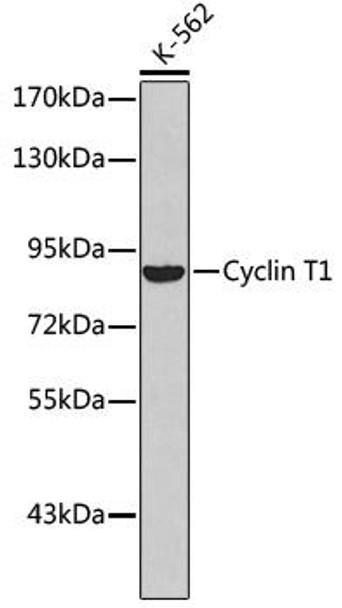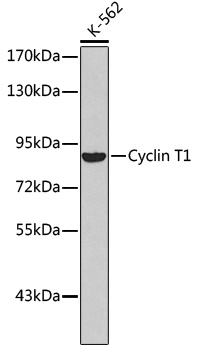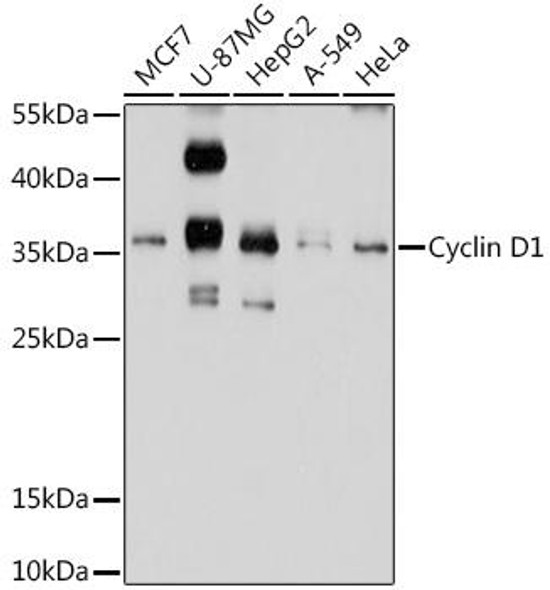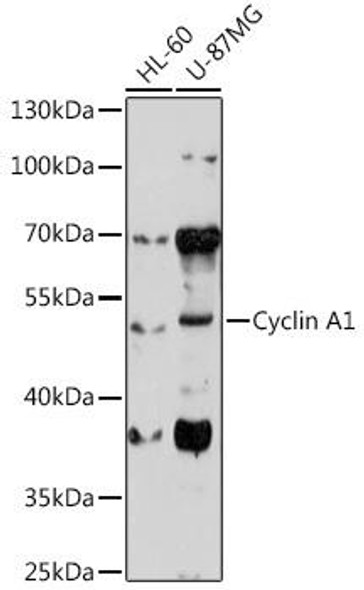Anti-Cyclin T1 Antibody (CAB2057)
- SKU:
- CAB2057
- Product type:
- Antibody
- Reactivity:
- Human
- Host Species:
- Rabbit
- Isotype:
- IgG
- Research Area:
- Cell Cycle
Description
| Antibody Name: | Anti-Cyclin T1 Antibody |
| Antibody SKU: | CAB2057 |
| Antibody Size: | 20uL, 50uL, 100uL |
| Application: | WB |
| Reactivity: | Human |
| Host Species: | Rabbit |
| Immunogen: | A synthetic peptide corresponding to a sequence within amino acids 220-320 of human Cyclin T1 (NP_001231.2). |
| Application: | WB |
| Recommended Dilution: | WB 1:500 - 1:2000 |
| Reactivity: | Human |
| Positive Samples: | K-562 |
| Immunogen: | A synthetic peptide corresponding to a sequence within amino acids 220-320 of human Cyclin T1 (NP_001231.2). |
| Purification Method: | Affinity purification |
| Storage Buffer: | Store at -20°C. Avoid freeze / thaw cycles. Buffer: PBS with 0.02% sodium azide, 50% glycerol, pH7.3. |
| Isotype: | IgG |
| Sequence: | HWWE YVDA TVTL ELLD ELTH EFLQ ILEK TPNR LKRI WNWR ACEA AKKT KADD RGTD EKTS EQTI LNMI SQSS SDTT IAGL MSMS TSTT SAVP SLPV SEES S |
| Gene ID: | 904 |
| Uniprot: | O60563 |
| Cellular Location: | Nucleus |
| Calculated MW: | 21kDa/80kDa |
| Observed MW: | 87kDa |
| Synonyms: | CCNT1, CCNT, CYCT1, HIVE1, cyclin-T1 |
| Background: | This gene encodes a member of the highly conserved cyclin C subfamily. The encoded protein tightly associates with cyclin-dependent kinase 9, and is a major subunit of positive transcription elongation factor b (p-TEFb). In humans, there are multiple forms of positive transcription elongation factor b, which may include one of several different cyclins along with cyclin-dependent kinase 9. The complex containing the encoded cyclin and cyclin-dependent kinase 9 acts as a cofactor of human immunodeficiency virus type 1 (HIV-1) Tat protein, and is both necessary and sufficient for full activation of viral transcription. This cyclin and its kinase partner are also involved in triggering transcript elongation through phosphorylation of the carboxy-terminal domain of the largest RNA polymerase II subunit. Overexpression of this gene is implicated in tumor growth. Alternative splicing results in multiple transcript variants. |
| UniProt Protein Function: | CCNT1: Regulatory subunit of the cyclin-dependent kinase pair (CDK9/cyclin-T1) complex, also called positive transcription elongation factor B (P-TEFb), which is proposed to facilitate the transition from abortive to productive elongation by phosphorylating the CTD (carboxy-terminal domain) of the large subunit of RNA polymerase II (RNA Pol II). In case of HIV or SIV infections, binds to the transactivation domain of the viral nuclear transcriptional activator, Tat, thereby increasing Tat's affinity for the transactivating response RNA element (TAR RNA). Serves as an essential cofactor for Tat, by promoting RNA Pol II activation, allowing transcription of viral genes. Cyclin-T1 is the predominant cyclin that associates with CDK9 to form a heterodimer called P-TEFb. P-TEFb forms a complex with AFF4/AF5Q31. Interacts with the transactivation region of HIV-1, HIV-2 and SIV Tat. Component of a complex which is at least composed of HTATSF1/Tat-SF1, P-TEFb complex, RNA pol II, SUPT5H, and NCL/nucleolin. Component of the 7SK snRNP complex at least composed of P-TEFb (composed of CDK9 and CCNT1/cyclin-T1), HEXIM1, HEXIM2, BCDIN3, SART3 proteins and 7SK and U6 snRNAs. Interacts with MDFIC. Ubiquitously expressed. Belongs to the cyclin family. Cyclin C subfamily. |
| UniProt Protein Details: | Protein type:Cell cycle regulation; Transcription initiation complex Chromosomal Location of Human Ortholog: 12q13.11 Cellular Component: nucleoplasm; transcription elongation factor complex b; nucleolus; nucleus Molecular Function:protein binding; snRNA binding; DNA binding; chromatin binding; protein kinase binding Biological Process: transcription from RNA polymerase II promoter; transcription initiation from RNA polymerase II promoter; transcription, DNA-dependent; viral reproduction; positive regulation of viral transcription; cell cycle; protein amino acid phosphorylation; cell division; transforming growth factor beta receptor signaling pathway; RNA elongation from RNA polymerase II promoter; gene expression; positive regulation of transcription from RNA polymerase II promoter; regulation of cyclin-dependent protein kinase activity |
| NCBI Summary: | This gene encodes a member of the highly conserved cyclin C subfamily. The encoded protein tightly associates with cyclin-dependent kinase 9, and is a major subunit of positive transcription elongation factor b (p-TEFb). In humans, there are multiple forms of positive transcription elongation factor b, which may include one of several different cyclins along with cyclin-dependent kinase 9. The complex containing the encoded cyclin and cyclin-dependent kinase 9 acts as a cofactor of human immunodeficiency virus type 1 (HIV-1) Tat protein, and is both necessary and sufficient for full activation of viral transcription. This cyclin and its kinase partner are also involved in triggering transcript elongation through phosphorylation of the carboxy-terminal domain of the largest RNA polymerase II subunit. Overexpression of this gene is implicated in tumor growth. Alternative splicing results in multiple transcript variants. [provided by RefSeq, Apr 2013] |
| UniProt Code: | O60563 |
| NCBI GenInfo Identifier: | 9296942 |
| NCBI Gene ID: | 904 |
| NCBI Accession: | O60563.1 |
| UniProt Secondary Accession: | O60563,O60581, A9XU13, E7EX76, |
| UniProt Related Accession: | O60563 |
| Molecular Weight: | 726 |
| NCBI Full Name: | Cyclin-T1 |
| NCBI Synonym Full Names: | cyclin T1 |
| NCBI Official Symbol: | CCNT1 |
| NCBI Official Synonym Symbols: | CCNT; CYCT1; HIVE1 |
| NCBI Protein Information: | cyclin-T1; cyclin C-related protein; CDK9-associated C-type protein; human immunodeficiency virus type 1 (HIV-1) expression (elevated) 1 |
| UniProt Protein Name: | Cyclin-T1 |
| Protein Family: | Cyclin |
| UniProt Gene Name: | CCNT1 |
| UniProt Entry Name: | CCNT1_HUMAN |











